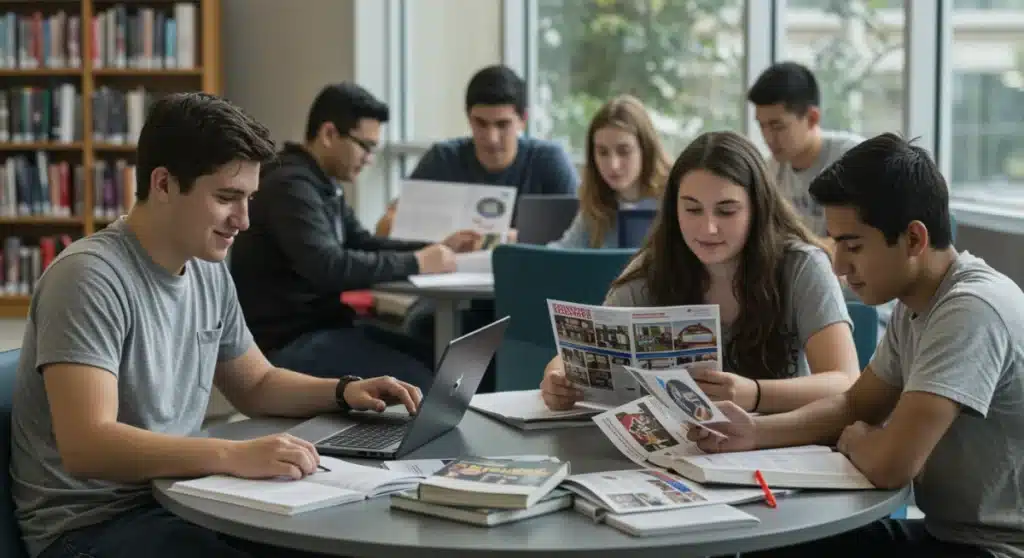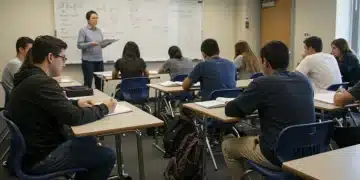College Prep 2025: A Checklist for Juniors & Seniors

Preparing for College: A 2025 Checklist for High School Juniors and Seniors (PRACTICAL SOLUTIONS) is now a critical focus for students aiming for higher education. As the academic landscape continues to evolve, understanding the latest requirements and strategies is paramount for a successful application cycle.
Understanding the 2025 Admissions Landscape
The 2025 college admissions cycle is currently unfolding with several key updates affecting high school juniors and seniors. These changes, driven by evolving educational policies and institutional responses to recent trends, demand proactive engagement from prospective applicants. Students must stay informed about altered testing policies and updated application platforms.
Recent developments indicate a continued shift towards holistic review processes, emphasizing a broader range of student attributes beyond just grades and test scores. Universities are increasingly valuing diverse experiences, leadership roles, and a demonstrated commitment to community involvement. This holistic approach means every aspect of a student’s profile plays a significant role in their application.
Key Changes in Standardized Testing
Standardized testing remains a component for many institutions, but its role has become more flexible. While some universities are reinstating test score requirements, others maintain test-optional policies. This mixed approach necessitates careful research into each prospective college’s specific guidelines.
- Many institutions are now test-flexible, allowing students to submit SAT or ACT scores, or even alternative assessments.
- The digital SAT format, introduced in 2024, is now fully implemented and impacts how students prepare and take the exam.
- ACT also offers computer-based testing options, providing more flexibility for students globally.
Crafting a Strong Academic Profile
A robust academic record remains the cornerstone of any successful college application. For high school juniors and seniors, this means not only maintaining high grades but also strategically selecting courses that demonstrate rigor and intellectual curiosity. Colleges look for consistency and a willingness to challenge oneself.
Beyond core subjects, advanced placement (AP), international baccalaureate (IB), and dual enrollment courses can significantly enhance an applicant’s profile. These courses signal to admissions committees that a student is prepared for the academic demands of higher education. Furthermore, colleges often consider the context of a student’s high school, evaluating their performance relative to the opportunities available.
Course Selection and GPA Management
Strategic course selection is vital. Students should aim for a challenging curriculum that aligns with their potential major or academic interests. A downward trend in grades during senior year can negatively impact an application, even after acceptance.
- Prioritize AP, IB, or dual enrollment courses in subjects of interest or intended major.
- Maintain a strong GPA, especially in junior and senior years, as these are closely scrutinized.
- Seek opportunities for independent study or research projects to showcase initiative.
Navigating the College Application Process
The college application process involves numerous steps, from selecting target schools to submitting compelling essays. For the 2025 cycle, applicants must be aware of deadlines, platform requirements, and essay prompts that may have evolved. Early planning and organization are crucial to avoid last-minute stress and ensure all components are submitted accurately and on time.
Utilizing platforms like the Common Application, Coalition Application, or specific university portals requires attention to detail. Each platform has unique features and requirements, and understanding these differences is key. Students should create a master checklist for each institution to track deadlines for applications, recommendations, and supplementary materials.
Mastering Application Essays and Recommendations
Essays offer a unique opportunity for applicants to showcase their personality, experiences, and aspirations beyond academic metrics. A well-crafted essay can significantly strengthen an application, providing insights into a student’s character and intellectual depth. Similarly, strong letters of recommendation from teachers and counselors who know the student well can provide valuable third-party endorsements.
- Start brainstorming essay topics early and allocate ample time for drafting and revisions.
- Choose recommenders who can speak to specific qualities and achievements, not just general praise.
- Proofread all application materials meticulously to eliminate errors.
Exploring Financial Aid and Scholarships
Funding college education is a significant concern for many families. For the 2025 academic year, understanding the nuances of financial aid—including federal, state, and institutional aid—is more important than ever. Recent changes to the Free Application for Federal Student Aid (FAFSA) process aim to simplify the application, but families still need to be diligent in completing it accurately and promptly.
Beyond federal aid, numerous scholarships are available from various sources, including universities, private organizations, and community groups. Identifying and applying for these scholarships can substantially reduce the financial burden of college. It’s essential to begin this search early and tailor applications to specific scholarship criteria.

The new FAFSA Simplification Act has streamlined the application, making it potentially easier for more students to qualify for federal aid. However, families must be aware of new terminology and data requirements. Consulting with a financial aid advisor or high school counselor can provide invaluable guidance through this complex process. This ongoing evolution in financial aid policies underlines the need for continuous vigilance and proactive engagement.
Key Financial Aid Deadlines and Resources
- Complete the FAFSA as soon as it becomes available to maximize aid eligibility.
- Research institutional scholarships offered by prospective colleges, which often have separate application processes.
- Explore private scholarship databases and local community foundations for additional funding opportunities.
Extracurricular Engagement and Leadership
Beyond academics, colleges are keenly interested in how students spend their time outside the classroom. Extracurricular activities, volunteer work, and leadership roles provide crucial insight into a student’s passions, commitment, and ability to contribute to a college community. For high school juniors and seniors, it’s not simply about accumulating activities but demonstrating depth and impact.
Admissions committees seek students who have made meaningful contributions to their chosen activities, whether through sustained participation, leadership positions, or significant achievements. Quality often trumps quantity; a few deeply engaging experiences are generally more impactful than a long list of superficial involvements. These activities help paint a picture of a well-rounded and engaged individual.
Showcasing Impact and Commitment
When detailing extracurriculars, focus on the impact made and the skills developed. Leadership roles, even in seemingly small capacities, demonstrate initiative and responsibility. Colleges want to see how students have grown and contributed, rather than just participated.
- Focus on activities where sustained involvement and leadership can be demonstrated.
- Quantify achievements whenever possible (e.g., ‘raised $500 for charity,’ ‘led a team of 10 volunteers’).
- Seek out opportunities that align with academic interests or future career goals to show coherence.
The Importance of Campus Visits and Research
Visiting college campuses, either in person or virtually, is an indispensable step in the decision-making process. These visits provide students with a firsthand feel for the campus culture, academic environment, and overall student life. For juniors, early visits can help refine college lists, while seniors can use them to solidify their top choices before making a final commitment.
Beyond physical visits, extensive online research is crucial. College websites, virtual tours, student forums, and social media channels offer a wealth of information about programs, faculty, and student experiences. This comprehensive research helps students identify institutions that are the best fit academically, socially, and financially. Understanding the nuances of each campus can make a significant difference.
Making the Most of Campus Interactions
During campus visits, actively engage with current students and faculty. Ask questions that are important to your personal and academic goals. Attending information sessions and tours provides general overview, but one-on-one interactions can offer deeper insights into specific programs or campus life. These interactions can also help demonstrate your interest to the admissions office.
- Prepare a list of questions to ask during campus tours and information sessions.
- Connect with current students studying your intended major to gain authentic perspectives.
- Follow up with admissions counselors or faculty members if you have additional questions after your visit.
| Key Preparation Area | Brief Description |
|---|---|
| Academic Rigor | Focus on challenging courses like AP/IB and maintain a strong GPA, especially in junior/senior years. |
| Application Strategy | Understand specific platform requirements, craft compelling essays, and secure strong recommendations. |
| Financial Planning | Complete the FAFSA early and actively seek out scholarships to reduce college costs. |
| Extracurricular Impact | Demonstrate deep involvement and leadership in chosen activities, showcasing growth and contribution. |
Frequently Asked Questions About College Prep 2025
The 2025 cycle sees continued evolution in standardized testing policies, with some schools reinstating requirements while others remain test-optional. Additionally, the FAFSA Simplification Act has streamlined the financial aid application process, impacting eligibility and submission requirements for many families, necessitating careful review of new guidelines.
Extracurricular activities remain very important, contributing significantly to a holistic review. Colleges seek depth and impact over breadth, valuing sustained involvement, leadership roles, and demonstrated commitment. Students should focus on showcasing how their activities have fostered growth and contributed to their communities, aligning with their personal narrative.
High school juniors should ideally begin college preparation in the spring of their junior year. This includes researching colleges, preparing for standardized tests, starting to think about essay topics, and engaging in meaningful extracurriculars. Early planning provides ample time to refine choices and strengthen application components effectively.
College essays are crucial for the 2025 application process, serving as a primary means for applicants to convey their unique voice, experiences, and aspirations. A well-crafted essay can highlight personality traits and intellectual curiosity not evident in academic records, making it a powerful tool for distinguishing oneself in a competitive applicant pool.
While virtual tours offer convenience and a good initial overview, in-person campus visits are still highly recommended when possible. They provide an invaluable firsthand feel for the campus culture, student body, and academic environment. Combining both virtual and physical visits offers the most comprehensive understanding to aid in decision-making.
What Happens Next
As the 2025 college application cycle progresses, students and families must remain agile and informed. Ongoing updates regarding financial aid, standardized testing, and institutional policies are anticipated. Staying connected with high school counselors, college admissions offices, and official educational resources will be crucial. The landscape of higher education is dynamic, and proactive engagement ensures applicants can adapt to new requirements and leverage emerging opportunities. Watch for further guidance from education authorities as the academic year unfolds.





